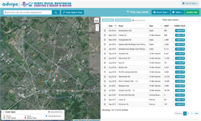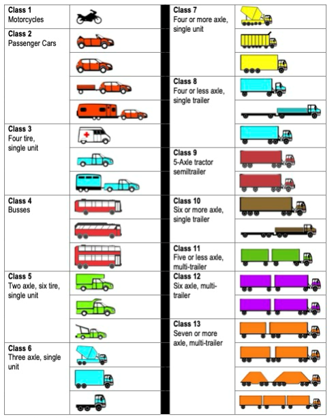DVRPC is counting a region in motion. As leaders in travel monitoring, we provide access to thousands of traffic counts throughout the region. Traffic count data on this website is provided as a public service.
Traffic Count Data is used to develop policies, regulations, and design decisions about transportation infrastructure
Bicycle and Pedestrian Counts
DVRPC counts bicyclists and pedestrians because count data helps us understand and plan for the role bicyclists and pedestrians play in our transportation network. Similar to how planners use vehicular traffic counts to analyze roadway facilities, our bicycle and pedestrian counting program allows planners to measure existing levels of bicycling and walking, monitor travel trends, plan for new or improved facilities and measure outcomes of bicycle and pedestrian related projects.
Traffic Count Viewer
Please use this viewer to access traffic count data from across the region.

Why does DVRPC conduct traffic counts?
The Office of Travel Monitoring performs vehicle counts for one of several reasons:
- PennDOT contracts with DVRPC to perform annual counts in PennDOT’s District 6
- project counts for District 6 that are not part of the annual PennDOT request;
- counts to help calibrate and maintain the travel demand model and for a 5 year travel trends report;
- project counts for DVRPC project managers as they are needed.
Type of Counts
There are various types of data that can be collected. The following section describes the 5 types of data that we collect about traffic and movements.
- Volume: Total volume on a segment of roadway in either an hourly or 15 minute interval. This can be directional and typically has a duration of 48 hours to 8 days. This can be total volume of vehicles, bicycles or pedestrians.
- Class: Total volume on a segment of roadway that differentiates between the different types of vehicles that have passed at this location. There are 13 FHWA (Federal Highway Administration) classifications. These classifications range from motorcycle to segmented tractor trailer.
- Speed: The approximate speed of passing vehicles can be determined, displaying volumes by speed starting at 15 mph and bins increasing by 10 mph, with an average speed being calculated.
- Manual Class: A special classification count that adds 3 more vehicles types to the schema: splitting “busses” into “Busses” and “School Busses” and adding an extra class of heavy articulated truck. This count is conducted on sight by a technician and is performed over a 6 hour span, either 6am - 12pm or 12pm - 6pm.
- Turning Movement: Total traffic volume through an intersection that counts traffic through each turn and movement (thru, left, right) for each leg of an intersection.

Additional Definitions
- Annual Average Daily Volume: An estimate of average daily volume for a location for that year it was measured. (also, this can be grouped with the other definitions.
How we take a traffic count
A traffic count taken using an ATR (automatic traffic recorder). This usually consists of a small box with rubber pneumatic tubes laid across the roadway or bike path. It can also be a video camera that records traffic and is transcribed later. For pedestrian volumes it consist of a box placed at hip level on a pole facing pedestrian traffic using infrared beams to record passerbys (video can also be used).
All of our equipment is clearly labeled as belonging to DVRPC and has our phone number on it.
The following video shows how a typical vehicle count is placed:
https://drive.google.com/file/d/1JMpgPcD9zxUW3Vb91TOu8ZsyvDOjnuhp/view?ts=6238ba42
For more information contact:
Joshua Rocks jrocks@dvrpc.org or Jonathan Ferullo jferullo@dvrpc.org
News
COVID-19 Travel Trends: New Travel Trends Report Shows Increased Travel Halted by COVID-19 Pandemic